Israeli gun ownership rising as violence surges
- Published
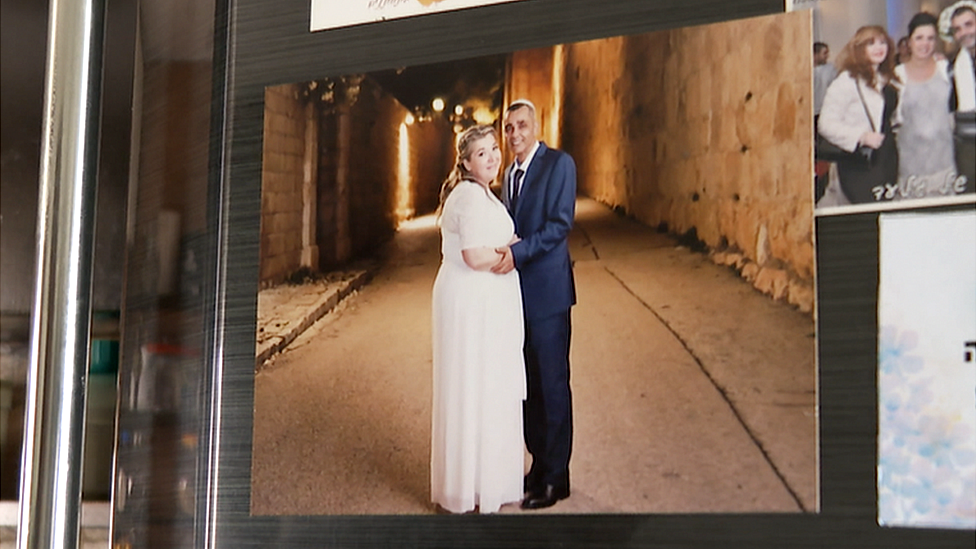
Eli and Natali Mizrahi were killed in a shooting attack at a synagogue in East Jerusalem in January
Shimon Mizrahi points from his apartment balcony out to a large two-lane road.
On the other side is a synagogue, where children are playing.
The retiree lives in Neve Yaakov, a settlement in Israeli-occupied East Jerusalem that is considered illegal under international law, though Israel disputes this.
He points to where outside the synagogue a Palestinian gunman killed his son and daughter-in-law, Eli and Natali Mazrahi, after they had gone downstairs on hearing gunshots.
"The man was standing at the crossroad and fired in all directions. It was possible that my son was there," Shimon says.
"It's difficult, it's difficult. It's as if I don't live in reality," he adds.
"I don't have a day or night. I can't eat. I don't feel anything."
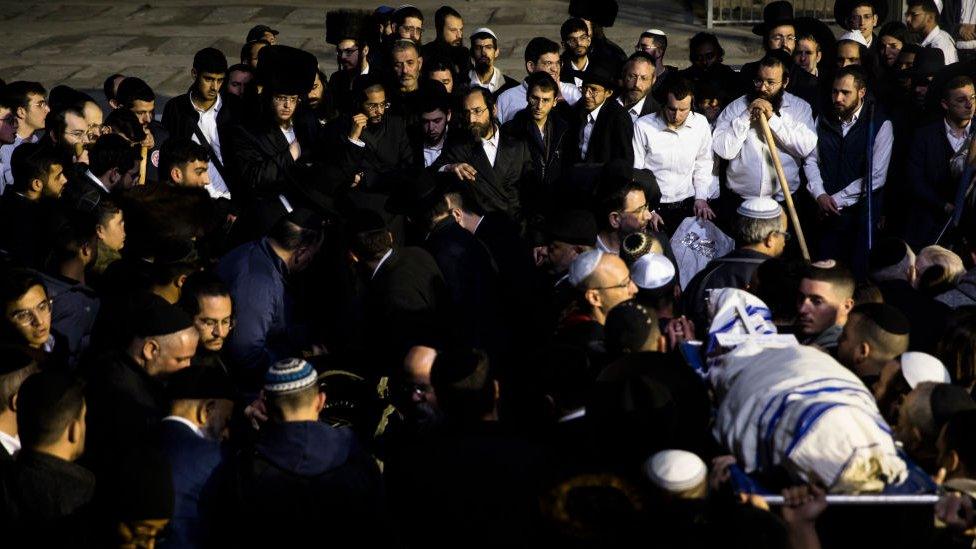
Family and friends of Eli and Natali Mizrahi carried their bodies during their funeral
Another five people died in the January attack, making it the deadliest of its kind for years.
Such events have added to a perception among some Israelis that the authorities are not protecting them.
"I blame the prime minister [Benjamin Netanyahu]. He's in charge of the army, security. I blame them," Shimon Mizrahi says.
It is people like the Mizrahis who Israel's National Security Minister, Itamar Ben-Gvir, wants to get more guns to so they can protect themselves.
Mr Ben-Gvir gained his Otzma Yehudit (Jewish Power) party a place in Israel's right-wing ruling coalition in November's parliamentary election by criticising the previous government's security record and making strongarm promises.
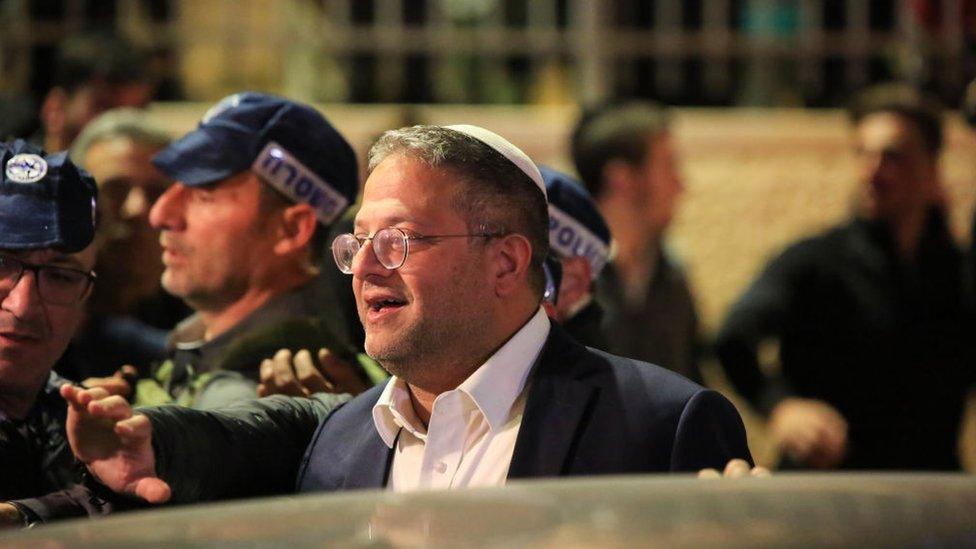
Israeli National Security Minister Itamar Ben-Gvir visited Neve Yaakov following the attack
These included arming army reservists and relaxing open fire rules.
And violence between Palestinians and Israelis has been escalating since the first half of last year.
Palestinians have committed deadly attacks in Israeli cities and Israel's army has carried out consistent nightly raids in the occupied West Bank. Last year saw Israeli security forces kill the most Palestinians since 2005. This year the violence has continued.
Police arrived at the Neve Yaakov attack several minutes after the shooting began, and killed the assailant as he tried to flee.
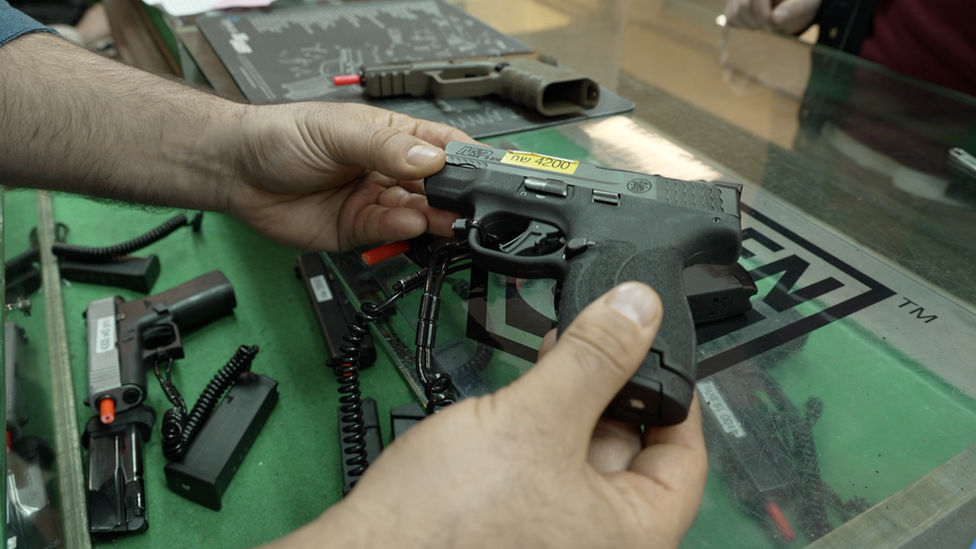
Israeli gun ownership is low at about 2% of the population
Following the January attack, Mr Ben-Gvir pledged to drastically speed up the issuing of gun permits, from around 2,000 to 10,000 a month, reducing the waiting time from six to eight months to two or three.
Israeli gun ownership is low at about 2% of the population. It compares to about 30% of the population owning a gun in the US.
Usually citizens are allowed to hold a pistol and a limit of 50 bullets.
But now applications for gun licences have more than doubled, according to the national security ministry, from 19,000 in 2021 to 42,236 last year - the highest annual number made."
At the Krav shooting range in southern Jerusalem, gun owner Hosha'aya Volman is one of those getting some practice in.
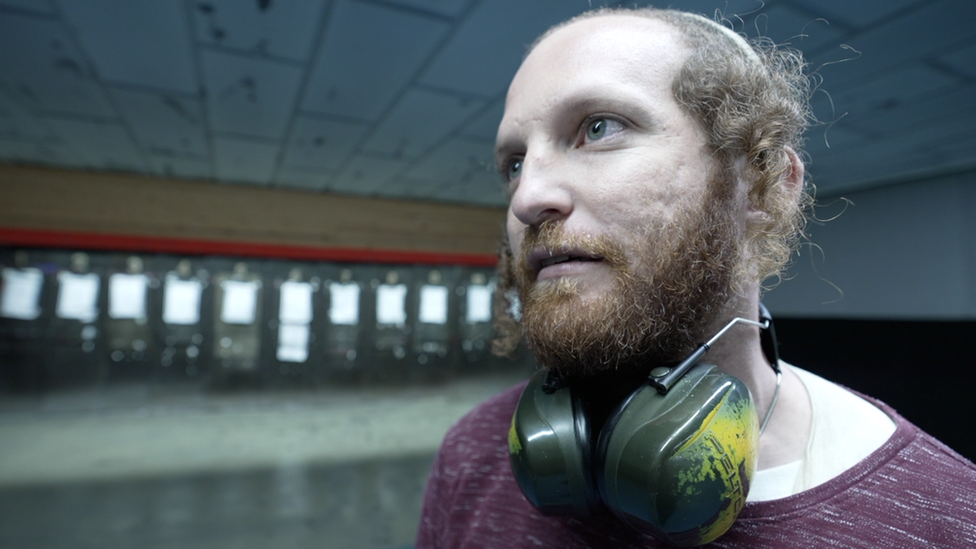
Hosha'aya Volman says he carries a weapon to be able to protect himself and those around him
"I carry a weapon for the simple reason that I won't be defenceless. I will be able to protect myself and those around me," Mr Volman says.
Mr Volman, 27, is an observant Jew and lives in the northern West Bank settlement Kohav HaShahar.
He needs to maintain a certain skill level - and pass physical and mental health tests - to keep his gun licence, part of Israel's strict regulations on owning guns.
Mr Volman did military service and got a gun after leaving.
Ultra-Orthodox Jewish people typically do not go into the military nor own guns, putting greater value on their religious observance.
And there are voices in Israel saying that ultra-Orthodox communities need to be better armed for their own protection.
But people taking security into their own hands is also being increasingly seen in the occupied West Bank.
In the West Bank, unarmed self-defence groups and public committees are organising the defence of villages and towns, where Palestinian Authority forces are absent - often due to not having the necessary Israeli army co-ordination to operate. These civilians fear attacks by Jewish settlers, after successive examples in recent months.
New, youthful militias have emerged, becoming the latest wave of what Palestinians consider resistance to the Israeli occupation.
Rela Mazali, the co-founder of the Israeli anti-gun activist coalition Gun Free Kitchen Tables, says there is no evidence that having more guns in civilians' hands thwarts attacks or reduces the number of victims.
"It is claimed and claimed again, and it's claimed so often that it's widely believed to be the truth. But there are really no supporting statistics."
And Ms Mazali says, rather, more guns have led to more murders.
She adds that there is already rising gun violence in Israel, correlated with a rising number of licences, and the victims of which are principally Palestinian citizens, and a high proportion of women - both Jewish and Palestinian.
"Rather than privatising personal and human security, what is needed are well trained, quickly responsive, carefully and thoughtfully responsive security forces, who don't exacerbate the situation - which is often the case here in Israel - but know how to contain and placate situations."
As Israel is convulsed by ongoing protests against the far-right government, primarily due to its proposed judicial changes, and with ongoing Israeli-Palestinian violence there currently appears little room for compromise or any such appeasement.